Fleurs du Mal Magazine


Or see the index
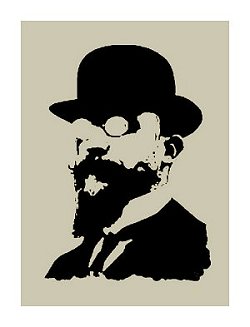
Erik Satie
(1866 – 1925)
La Comédie italienne
À la napolitaine
Scaramouche explique les beautés de l’état militaire.
On y est fortement malin, dit-il.
On fait peur aux civils.
Et les galantes aventures !
Et le reste !
Quel beau métier !
29 avril 1914
Erik Satie La Comédie italienne
fleursdumal.nl magazine
More in: Archive S-T, Erik Satie, Satie, Erik
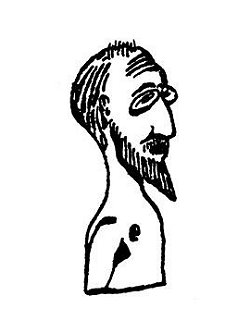
Erik Satie
(1866 – 1925)
Le Tango
Le tango est la danse du diable.
C’est celle qu’il préfère.
Il la danse pour se refroidir.
Sa femme, ses filles et ses domestiques se refroidissent.
5 mai 1914
Erik Satie Le Tango
fleursdumal.nl magazine
More in: Archive S-T, DANCE & PERFORMANCE, Erik Satie, Satie, Erik
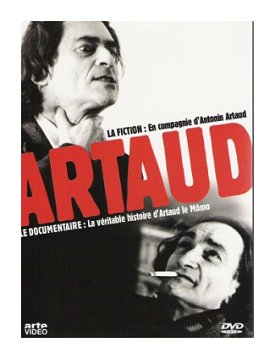 Van Gogh / Artaud. The Man Suicided by Society ♦ A few days before the opening of a van Gogh exhibition in Paris in 1947, gallery owner Pierre Loeb suggested that Antonin Artaud (1896-1948) write about the painter. Challenging the thesis of alienation, Artaud was determined to show how van Gogh’s exceptional lucidity made lesser minds uncomfortable.
Van Gogh / Artaud. The Man Suicided by Society ♦ A few days before the opening of a van Gogh exhibition in Paris in 1947, gallery owner Pierre Loeb suggested that Antonin Artaud (1896-1948) write about the painter. Challenging the thesis of alienation, Artaud was determined to show how van Gogh’s exceptional lucidity made lesser minds uncomfortable.
Wishing to prevent him from uttering certain “intolerable truths”, those who were disturbed by his painting drove him to suicide.
Based on the categories and the unusual designations put forward by Artaud in Van Gogh, the Man Suicided by Society, the exhibition will comprise some forty paintings, a selection of van Gogh’s drawings and letters, together with graphic works by the poet-illustrator.
The title of the exhibition is based on the title of Antonin Artaud’s book, Van Gogh the Man Suicided by Society Editions Gallimard, 1974
Musée d’Orsay Paris – until 6 july 2014
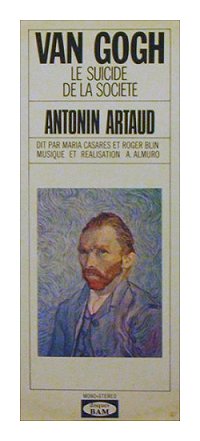
Publication:
Vincent Van Gogh-Antonin Artaud :
le suicidé de la société
Number of pages 192 , €39.00
EAN 9782370740038
Dimensions 34 x 25 cm
Publisher Skira Flammarion
Museum Musée d’Orsay
Language French
fleursdumal.nl magazine for art & literature
More in: Antonin Artaud, Art & Literature News, Artaud, Antonin, Suicide, Vincent van Gogh, Vincent van Gogh
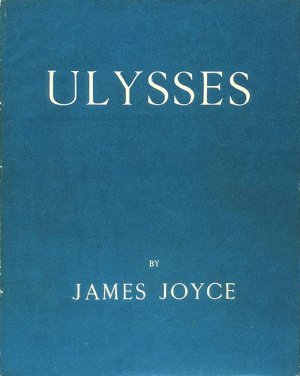
James Joyce
(1882-1941)
DEAR HEART, WHY WILL YOU USE ME SO?
Dear heart, why will you use me so?
Dear eyes that gently me upbraid,
Still are you beautiful — but O,
How is your beauty raimented!
Through the clear mirror of your eyes,
Through the soft cry of kiss to kiss,
Desolate winds assail with cries
The shadowy garden where love is.
And soon shall love dissolved be
When over us the wild winds blow–
But you, dear love, too dear to me,
Alas! why will you use me so?
“Dear heart, why will you use me so?” is reprinted from Chamber Music. James Joyce. London: Elkin Mathews, 1907
James Joyce poetry
fleursdumal.nl magazine
More in: Archive I-J, Joyce, James
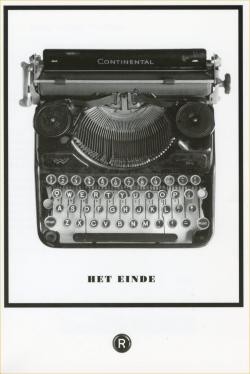
Schrijver Jacq Vogelaar overleden
Op maandag 9 december is de schrijver, essayist en criticus Jacq Vogelaar op 69-jarige leeftijd overleden. Jacq Vogelaar is het pseudoniem van de in 1944 in Tilburg geboren Frans Broers. Vogelaar kreeg in 2006 de Constantijn Huygensprijs voor zijn hele oeuvre.
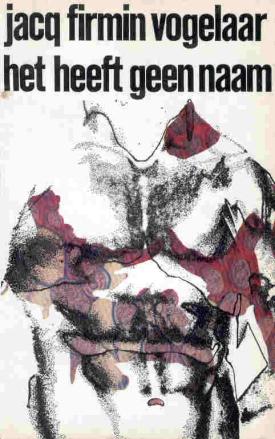
De schrijver studeerde Nederlands en filosofie en debuteerde in 1965 als dichter. Daarna schreef hij als Jacq Firmin Vogelaar een aantal experimentele romans als Anatomie van een glasachtig lichaam (1966) en Raadsels van het rund (1978). Voor zijn roman De dood als meisje van acht (1991) kreeg hij de F. Bordewijkprijs.
In 2006 publiceerde Jacq Vogelaar zijn bundel: Over kampliteratuur, waaarin hij verslag doet van zijn zoektocht door de literatuur over de goelag-kampen in de Sovjet-Unie en de Duitse concentratie- en vernietigingskampen.
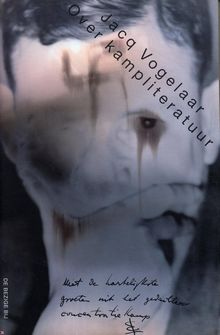
Jacq Vogelaar schreef vele jaren literatuurkritieken en essays voor De Groene Amsterdammer en voor het literatuurtijdschrift Raster.
Werken van Jacq Firmin Vogelaar
De komende en gaande man (1965)
Parterre, en van glas (1965)
Anatomie van een glasachtig lichaam (1966)
Vijand gevraagd (1967)
Gedaanteverandering of ‘n metaforiese muizeval (1968)
Het heeft geen naam (1968)
Kaleidiafragmenten (1970)
Kunst als kritiek (1972)
Konfrontaties (1974)
‘Ik in Kapitaal. Voorstudie van Pp.’, in Het mes in het beeld (1976)
Het mes in het beeld (1976)
Raadsels van het rund (1978)
Alle vlees (1980)
Oriëntaties (1983)
Het geheim van de bolhoeden (1986)
Terugschrijven (1987)
Terugschrijven (1988)
Verdwijningen (1988)
De dood als meisje van acht (1991)
Speelruimte (1991)
De dood als meisje van acht (1992)
Het literair klimaat 1986-1992 (1993)
Striptease van een ui (1993)
Weg van de pijn (1994)
Uit het oog (1997)
Inktvraat (1998)
Meer speelruimte (1998)
Taats onder mannen (2001)
Je zit niet alleen in je vel (2010)
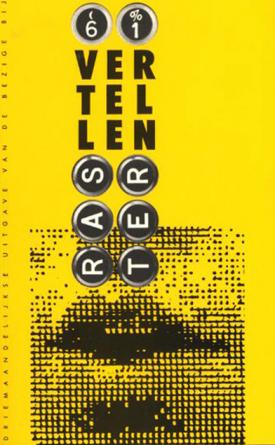
Jacq Firmin Vogelaar (Tilburg 1944 – Utrecht 2013)
fleursdumal.nl magazine
More in: Art & Literature News, EXPERIMENTAL POETRY, In Memoriam
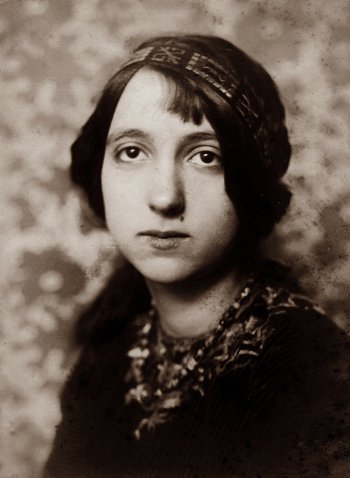
Mireille Havet
(1898-1932)
Connaissance
À la comtesse Jean de Limur
La vie souple, comme une cravache
en plein visage m’a flagellée.
Je m’en vais douce, inoffensive
dans le crépuscule printanier
qui emplit les rues de jeux de billes,
de marelles étoilées.
La lampe
allumée sur le potage,
les faïences,
tel qu’on aurait pu être,
Mais la vie trop souple
de sa fine lanière cingle
les enfants tristes,
et l’âme se plie féline,
domptée
vers la mort qui est sa récompense.
Les enfants du cordonnier
jouent dans la cour
avec des cris qui montent
rappelant des hangars, des faubourgs ;
un arbre bouge tout pointé
de bourgeons verts
et mes larmes sourdes et tenaces
sont prises en moi,
source merveilleuse qui chemine
et s’en va
sous la terre
s’épuiser au long des larmes stériles
de l’amour,
sous la lune grise
qui annonce la belle saison,
les mains enlacées
les lents et balancés
retours à la maison
— la nuit —
au matin l’aubépinier entier s’était fleuri,
et contre moi
comme une bête,
comme un ange terrassé
j’étrangle ma joie d’hier
neuve, insolente
et dont j’aimerais mourir
Ô solitude
magnifique et suprême
que ton dur visage
se mesure bien à mon regard,
face à face comme toujours,
mon âme nue se déploie
au silence des larmes.
Toute ma jeunesse me tire cependant
m’entraîne,
dans l’incroyable
foule humaine
et je reprends la chaîne qui nous lie
à la terre.
Il n’y a rien d’autre,
le pain quotidien
le travail
la jouissance étonnante
du chagrin
qui ressemble à la mer.
Nous mourons d’espoirs,
de nuances douces couleur de lilas
et plus fragiles encore au contact
des doigts
que le bleu effronté des papillons des îles.
Le coup direct ne tue pas si bien
que l’aiguillon secret
qui taquine en silence,
hameçon subtil
glissé dans l’eau
entre les tiges de lotus blancs.
Promenades en bateau,
première étoile
naissante
et qui éclate comme une fleur
à l’horizon des anges,
Vénus au nom de malheur.
J’ai tout vu
le balancement des rames
au fil du courant,
la main douce dans la petite vague
le charme des femmes
leur tendresse navrante
caprice sentimental d’un instant
ont perdu mon âme
qui cherchait leur douceur.
Hamlet, Ophélie, les deux pigeons.
Je poursuis le dérisoire visage de l’amour
au seuil condamnable
au seuil écolier
de mes vingt ans.
Très menteuse et très chère
je vous dédie et je vous signe
ce poème,
vous y retrouverez
tout ce que vous détestez en moi
et même le peu que vous aimiez.
Le jeu est fini
la comédie terminée,
je m’en retourne
front lourd et jambes rompues
vers mon enfance
à la poursuite de la lumière
que vous m’avez empoisonnée.
Ô menteuse
la plus cruelle,
souriez à l’éternelle méchanceté humaine
qui me fit en neuf jours
votre petit arlequin bariolé
et ce soir le pierrot balafré
qui vous quitte
visage blanc camouflé de gifles
dans l’incohérence crépusculaire
et douce
du printemps.
La Revue européenne n°3 (1er mai 1923)
Mireille Havet poetry
fleursdumal.nl magazine
More in: Archive G-H, Havet, Mireille, Mireille Havet
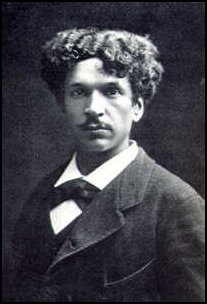
Charles Cros
(1842-1888)
Testament
Si mon âme claire s’éteint
Comme une lampe sans pétrole,
Si mon esprit, en haut, déteint
Comme une guenille folle,
Si je moisis, diamantin,
Entier, sans tache, sans vérole,
Si le bégaiement bête atteint
Ma persuasive parole,
Et si je meurs, soûl, dans un coin
C’est que ma patrie est bien loin
Loin de la France et de la terre.
Ne craignez rien, je ne maudis
Personne. Car un paradis
Matinal, s’ouvre et me fait taire.
Charles Cros poetry
fleursdumal.nl magazine
More in: Archive C-D, Cros, Charles
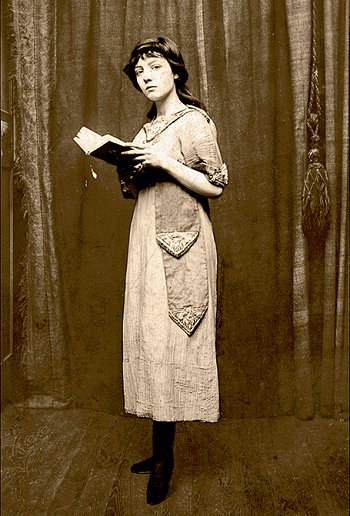
Mireille Havet
(1898-1932)
Le voyage
Hier, j’ai rencontré le voyage.
Il m’a dit bonjour. Il m’a dit : viens-tu ?
Son beau train flambant soufflait, sur les rails comme le cheval qui piaffe entre les rênes sûres.
Il m’a dit : regarde, le ciel lavé d’après les grêles d’avril est ouvert à la sortie du hall et voici déjà la campagne offrant les deux paumes de ses plaines, les longues sentes effilées de ses doigts accrochés aux forêts mitoyennes et ses ongles purs où sourit une étoile, qui sont les lacs, les fontaines, les abreuvoirs au seuil des fermes et la source jaillissante qui s’égrène entre la haie de crocus.
Va ! Prends la portière, ne consulte point d’indicateur, Toutes les heures sont belles et toutes les lignes sont bonnes… Si tu es un conquérant, il n’y a que le voyage !
Et je suis restée immobile et timide.
Le beau train dans la gare a sifflé… Son dernier wagon sur la voie qui tourne s’en est allé, tremblant comme un grelot noir.
Au retour, la ville me parut plus meurtrière encore. Je toussais le long de ses quais interminables. Enfant Prodigue qui avait refusé l’espace comme on renvoie un chien errant.
J’ai repris la routine des jours, l’oisiveté qui dévore plus que l’amour… Le grand licol de la ville baille autour de mon cou et cependant je n’ai pas su m’enfuir, craignant peut-être la solitude et la rencontre de mon âme que je veux croire perdue ?
Mais, au tournant de la rue, entre deux voitures qui se heurtaient, je l’ai rencontrée, mon âme. Elle sautait devant moi comme une petite fille folle et ses deux mains tremblantes se secouaient dans l’air. Elle avait cependant un tablier rosé… On aurait dit une meurtrière de huit ans. Comme j’allais l’atteindre, un camion m’en à séparée,… dès qu’il fut passé, je bondis, mais hélas je ne trouvai plus, planté dans l’herbe courte des Champs-Elysées, qu’un petit coquelicot maigre et ardent qui battait de la crête comme un petit coq malade.
Alors, je suis passée, prononçant des mots de tristesse vagues et mouvants comme des algues et qui se perdirent dans la rumeur de la ville, s’unissant au cri perpétuel de Paris qui nous enfarine, afin d’en poudrer son ciel clair, nos rêves les plus beaux, nos chairs les plus fines et nos désirs avortés d’univers.
Paris 1918
Revue Les Écrits Nouveaux Tome III – N°20 (Aout 1919)
Mireille Havet poetry
fleursdumal.nl magazine
More in: Archive G-H, Havet, Mireille, Mireille Havet
![]()
Georg Trakl
(1887-1914)
Psalm
Karl Kraus zugeeignet
Es ist ein Licht, das der Wind ausgelöscht hat.
Es ist ein Heidekrug, den am Nachmittag ein Betrunkener verläßt.
Es ist ein Weinberg, verbrannt und schwarz mit Löchern voll Spinnen.
Es ist ein Raum, den sie mit Milch getüncht haben.
Der Wahnsinnige ist gestorben. Es ist eine Insel der Südsee,
Den Sonnengott zu empfangen. Man rührt die Trommeln.
Die Männer führen kriegerische Tänze auf.
Die Frauen wiegen die Hüften in Schlinggewächsen und Feuerblumen,
Wenn das Meer singt. O unser verlorenes Paradies.
Die Nymphen haben die goldenen Wälder verlassen.
Man begräbt den Fremden. Dann hebt ein Flimmerregen an.
Der Sohn des Pan erscheint in Gestalt eines Erdarbeiters,
Der den Mittag am glühenden Asphalt verschläft.
Es sind kleine Mädchen in einem Hof in Kleidchen voll herzzerreißender Armut!
Es sind Zimmer, erfüllt von Akkorden und Sonaten.
Es sind Schatten, die sich vor einem erblindeten Spiegel umarmen.
An den Fenstern des Spitals wärmen sich Genesende.
Ein weißer Dampfer am Kanal trägt blutige Seuchen herauf.
Die fremde Schwester erscheint wieder in jemands bösen Träumen.
Ruhend im Haselgebüsch spielt sie mit seinen Sternen.
Der Student, vielleicht ein Doppelgänger, schaut ihr lange vom Fenster nach.
Hinter ihm steht sein toter Bruder, oder er geht die alte Wendeltreppe herab.
Im Dunkel brauner Kastanien verblaßt die Gestalt des jungen Novizen.
Der Garten ist im Abend. Im Kreuzgang flattern die Fledermäuse umher.
Die Kinder des Hausmeisters hören zu spielen auf und suchen das Gold des Himmels.
Endakkorde eines Quartetts. Die kleine Blinde läuft zitternd durch die Allee,
Und später tastet ihr Schatten an kalten Mauern hin, umgeben von Märchen und heiligen Legenden.
Es ist ein leeres Boot, das am Abend den schwarzen Kanal heruntertreibt.
In der Düsternis des alten Asyls verfallen menschliche Ruinen.
Die toten Waisen liegen an der Gartenmauer.
Aus grauen Zimmern treten Engel mit kotgefleckten Flügeln.
Würmer tropfen von ihren vergilbten Lidern.
Der Platz vor der Kirche ist finster und schweigsam, wie in den Tagen der Kindheit.
Auf silbernen Sohlen gleiten frühere Leben vorbei
Und die Schatten der Verdammten steigen zu den seufzenden Wassern nieder.
In seinem Grab spielt der weiße Magier mit seinen Schlangen.
Schweigsam über der Schädelstätte öffnen sich Gottes goldene Augen.
Georg Trakl poetry
fleursdumal.nl magazine
More in: Archive S-T, Kraus, Karl, Trakl, Georg

James Joyce
(1882-1941)
A Little Cloud
Eight years before he had seen his friend off at the North Wall and wished him godspeed. Gallaher had got on. You could tell that at once by his travelled air, his well-cut tweed suit, and fearless accent. Few fellows had talents like his and fewer still could remain unspoiled by such success. Gallaher’s heart was in the right place and he had deserved to win. It was something to have a friend like that.
Little Chandler’s thoughts ever since lunch-time had been of his meeting with Gallaher, of Gallaher’s invitation and of the great city London where Gallaher lived. He was called Little Chandler because, though he was but slightly under the average stature, he gave one the idea of being a little man. His hands were white and small, his frame was fragile, his voice was quiet and his manners were refined. He took the greatest care of his fair silken hair and moustache and used perfume discreetly on his handkerchief. The half-moons of his nails were perfect and when he smiled you caught a glimpse of a row of childish white teeth.
As he sat at his desk in the King’s Inns he thought what changes those eight years had brought. The friend whom he had known under a shabby and necessitous guise had become a brilliant figure on the London Press. He turned often from his tiresome writing to gaze out of the office window. The glow of a late autumn sunset covered the grass plots and walks. It cast a shower of kindly golden dust on the untidy nurses and decrepit old men who drowsed on the benches; it flickered upon all the moving figures, on the children who ran screaming along the gravel paths and on everyone who passed through the gardens. He watched the scene and thought of life; and (as always happened when he thought of life) he became sad. A gentle melancholy took possession of him. He felt how useless it was to struggle against fortune, this being the burden of wisdom which the ages had bequeathed to him.
He remembered the books of poetry upon his shelves at home. He had bought them in his bachelor days and many an evening, as he sat in the little room off the hall, he had been tempted to take one down from the bookshelf and read out something to his wife. But shyness had always held him back; and so the books had remained on their shelves. At times he repeated lines to himself and this consoled him.
When his hour had struck he stood up and took leave of his desk and of his fellow-clerks punctiliously. He emerged from under the feudal arch of the King’s Inns, a neat modest figure, and walked swiftly down Henrietta Street. The golden sunset was waning and the air had grown sharp. A horde of grimy children populated the street. They stood or ran in the roadway or crawled up the steps before the gaping doors or squatted like mice upon the thresholds. Little Chandler gave them no thought. He picked his way deftly through all that minute vermin-like life and under the shadow of the gaunt spectral mansions in which the old nobility of Dublin had roystered. No memory of the past touched him, for his mind was full of a present joy.
He had never been in Corless’s but he knew the value of the name. He knew that people went there after the theatre to eat oysters and drink liqueurs; and he had heard that the waiters there spoke French and German. Walking swiftly by at night he had seen cabs drawn up before the door and richly dressed ladies, escorted by cavaliers, alight and enter quickly. They wore noisy dresses and many wraps. Their faces were powdered and they caught up their dresses, when they touched earth, like alarmed Atalantas. He had always passed without turning his head to look. It was his habit to walk swiftly in the street even by day and whenever he found himself in the city late at night he hurried on his way apprehensively and excitedly. Sometimes, however, he courted the causes of his fear. He chose the darkest and narrowest streets and, as he walked boldly forward, the silence that was spread about his footsteps troubled him, the wandering, silent figures troubled him; and at times a sound of low fugitive laughter made him tremble like a leaf.
He turned to the right towards Capel Street. Ignatius Gallaher on the London Press! Who would have thought it possible eight years before? Still, now that he reviewed the past, Little Chandler could remember many signs of future greatness in his friend. People used to say that Ignatius Gallaher was wild Of course, he did mix with a rakish set of fellows at that time. drank freely and borrowed money on all sides. In the end he had got mixed up in some shady affair, some money transaction: at least, that was one version of his flight. But nobody denied him talent. There was always a certain . . . something in Ignatius Gallaher that impressed you in spite of yourself. Even when he was out at elbows and at his wits’ end for money he kept up a bold face. Little Chandler remembered (and the remembrance brought a slight flush of pride to his cheek) one of Ignatius Gallaher’s sayings when he was in a tight corner
“Half time now, boys,” he used to say light-heartedly. “Where’s my considering cap?”
That was Ignatius Gallaher all out; and, damn it, you couldn’t but admire him for it.
Little Chandler quickened his pace. For the first time in his life he felt himself superior to the people he passed. For the first time his soul revolted against the dull inelegance of Capel Street. There was no doubt about it: if you wanted to succeed you had to go away. You could do nothing in Dublin. As he crossed Grattan Bridge he looked down the river towards the lower quays and pitied the poor stunted houses. They seemed to him a band of tramps, huddled together along the riverbanks, their old coats covered with dust and soot, stupefied by the panorama of sunset and waiting for the first chill of night bid them arise, shake themselves and begone. He wondered whether he could write a poem to express his idea. Perhaps Gallaher might be able to get it into some London paper for him. Could he write something original? He was not sure what idea he wished to express but the thought that a poetic moment had touched him took life within him like an infant hope. He stepped onward bravely.
Every step brought him nearer to London, farther from his own sober inartistic life. A light began to tremble on the horizon of his mind. He was not so old, thirty-two. His temperament might be said to be just at the point of maturity. There were so many different moods and impressions that he wished to express in verse. He felt them within him. He tried weigh his soul to see if it was a poet’s soul. Melancholy was the dominant note of his temperament, he thought, but it was a melancholy tempered by recurrences of faith and resignation and simple joy. If he could give expression to it in a book of poems perhaps men would listen. He would never be popular: he saw that. He could not sway the crowd but he might appeal to a little circle of kindred minds. The English critics, perhaps, would recognise him as one of the Celtic school by reason of the melancholy tone of his poems; besides that, he would put in allusions. He began to invent sentences and phrases from the notice which his book would get. “Mr. Chandler has the gift of easy and graceful verse.” . . . “wistful sadness pervades these poems.” . . . “The Celtic note.” It was a pity his name was not more Irish-looking. Perhaps it would be better to insert his mother’s name before the surname: Thomas Malone Chandler, or better still: T. Malone Chandler. He would speak to Gallaher about it.
He pursued his revery so ardently that he passed his street and had to turn back. As he came near Corless’s his former agitation began to overmaster him and he halted before the door in indecision. Finally he opened the door and entered.
The light and noise of the bar held him at the doorways for a few moments. He looked about him, but his sight was confused by the shining of many red and green wine-glasses The bar seemed to him to be full of people and he felt that the people were observing him curiously. He glanced quickly to right and left (frowning slightly to make his errand appear serious), but when his sight cleared a little he saw that nobody had turned to look at him: and there, sure enough, was Ignatius Gallaher leaning with his back against the counter and his feet planted far apart.
“Hallo, Tommy, old hero, here you are! What is it to be? What will you have? I’m taking whisky: better stuff than we get across the water. Soda? Lithia? No mineral? I’m the same Spoils the flavour. . . . Here, garçon, bring us two halves of malt whisky, like a good fellow. . . . Well, and how have you been pulling along since I saw you last? Dear God, how old we’re getting! Do you see any signs of aging in me, eh, what? A little grey and thin on the top, what?”
Ignatius Gallaher took off his hat and displayed a large closely cropped head. His face was heavy, pale and cleanshaven. His eyes, which were of bluish slate-colour, relieved his unhealthy pallor and shone out plainly above the vivid orange tie he wore. Between these rival features the lips appeared very long and shapeless and colourless. He bent his head and felt with two sympathetic fingers the thin hair at the crown. Little Chandler shook his head as a denial. Ignatius Galaher put on his hat again.
“It pulls you down,” be said, “Press life. Always hurry and scurry, looking for copy and sometimes not finding it: and then, always to have something new in your stuff. Damn proofs and printers, I say, for a few days. I’m deuced glad, I can tell you, to get back to the old country. Does a fellow good, a bit of a holiday. I feel a ton better since I landed again in dear dirty Dublin. . . . Here you are, Tommy. Water? Say when.”
Little Chandler allowed his whisky to be very much diluted.
“You don’t know what’s good for you, my boy,” said Ignatius Gallaher. “I drink mine neat.”
“I drink very little as a rule,” said Little Chandler modestly. “An odd half-one or so when I meet any of the old crowd: that’s all.”
“Ah well,” said Ignatius Gallaher, cheerfully, “here’s to us and to old times and old acquaintance.”
They clinked glasses and drank the toast.
“I met some of the old gang today,” said Ignatius Gallaher. “O’Hara seems to be in a bad way. What’s he doing?”
“Nothing,” said Little Chandler. “He’s gone to the dogs.”
“But Hogan has a good sit, hasn’t he?”
“Yes; he’s in the Land Commission.”
“I met him one night in London and he seemed to be very flush. . . . Poor O’Hara! Boose, I suppose?”
“Other things, too,” said Little Chandler shortly.
Ignatius Gallaher laughed.
“Tommy,” he said, “I see you haven’t changed an atom. You’re the very same serious person that used to lecture me on Sunday mornings when I had a sore head and a fur on my tongue. You’d want to knock about a bit in the world. Have you never been anywhere even for a trip?”
“I’ve been to the Isle of Man,” said Little Chandler.
Ignatius Gallaher laughed.
“The Isle of Man!” he said. “Go to London or Paris: Paris, for choice. That’d do you good.”
“Have you seen Paris?”
“I should think I have! I’ve knocked about there a little.”
“And is it really so beautiful as they say?” asked Little Chandler.
He sipped a little of his drink while Ignatius Gallaher finished his boldly.
“Beautiful?” said Ignatius Gallaher, pausing on the word and on the flavour of his drink. “It’s not so beautiful, you know. Of course, it is beautiful. . . . But it’s the life of Paris; that’s the thing. Ah, there’s no city like Paris for gaiety, movement, excitement. . . . ”
Little Chandler finished his whisky and, after some trouble, succeeded in catching the barman’s eye. He ordered the same again.
“I’ve been to the Moulin Rouge,” Ignatius Gallaher continued when the barman had removed their glasses, “and I’ve been to all the Bohemian cafes. Hot stuff! Not for a pious chap like you, Tommy.”
Little Chandler said nothing until the barman returned with two glasses: then he touched his friend’s glass lightly and reciprocated the former toast. He was beginning to feel somewhat disillusioned. Gallaher’s accent and way of expressing himself did not please him. There was something vulgar in his friend which he had not observed before. But perhaps it was only the result of living in London amid the bustle and competition of the Press. The old personal charm was still there under this new gaudy manner. And, after all, Gallaher had lived, he had seen the world. Little Chandler looked at his friend enviously.
“Everything in Paris is gay,” said Ignatius Gallaher. “They believe in enjoying life, and don’t you think they’re right? If you want to enjoy yourself properly you must go to Paris. And, mind you, they’ve a great feeling for the Irish there. When they heard I was from Ireland they were ready to eat me, man.”
Little Chandler took four or five sips from his glass.
“Tell me,” he said, “is it true that Paris is so . . . immoral as they say?”
Ignatius Gallaher made a catholic gesture with his right arm.
“Every place is immoral,” he said. “Of course you do find spicy bits in Paris. Go to one of the students’ balls, for instance. That’s lively, if you like, when the cocottes begin to let themselves loose. You know what they are, I suppose?”
“I’ve heard of them,” said Little Chandler.
Ignatius Gallaher drank off his whisky and shook his had.
“Ah,” he said, “you may say what you like. There’s no woman like the Parisienne, for style, for go.”
“Then it is an immoral city,” said Little Chandler, with timid insistence, “I mean, compared with London or Dublin?”
“London!” said Ignatius Gallaher. “It’s six of one and half-a-dozen of the other. You ask Hogan, my boy. I showed him a bit about London when he was over there. He’d open your eye. . . . I say, Tommy, don’t make punch of that whisky: liquor up.”
“No, really. . . . ”
“O, come on, another one won’t do you any harm. What is it? The same again, I suppose?”
“Well . . . all right.”
“François, the same again. . . . Will you smoke, Tommy?”
Ignatius Gallaher produced his cigar-case. The two friends lit their cigars and puffed at them in silence until their drinks were served.
“I’ll tell you my opinion,” said Ignatius Gallaher, emerging after some time from the clouds of smoke in which he had taken refuge, “it’s a rum world. Talk of immorality! I’ve heard of cases, what am I saying?, I’ve known them: cases of . . . immorality. . . . ”
Ignatius Gallaher puffed thoughtfully at his cigar and then, in a calm historian’s tone, he proceeded to sketch for his friend some pictures of the corruption which was rife abroad. He summarised the vices of many capitals and seemed inclined to award the palm to Berlin. Some things he could not vouch for (his friends had told him), but of others he had had personal experience. He spared neither rank nor caste. He revealed many of the secrets of religious houses on the Continent and described some of the practices which were fashionable in high society and ended by telling, with details, a story about an English duchess, a story which he knew to be true. Little Chandler as astonished.
“Ah, well,” said Ignatius Gallaher, “here we are in old jog-along Dublin where nothing is known of such things.”
“How dull you must find it,” said Little Chandler, “after all the other places you’ve seen!”
Well,” said Ignatius Gallaher, “it’s a relaxation to come over here, you know. And, after all, it’s the old country, as they say, isn’t it? You can’t help having a certain feeling for it. That’s human nature. . . . But tell me something about yourself. Hogan told me you had . . . tasted the joys of connubial bliss. Two years ago, wasn’t it?”
Little Chandler blushed and smiled.
“Yes,” he said. “I was married last May twelve months.”
“I hope it’s not too late in the day to offer my best wishes,” said Ignatius Gallaher. “I didn’t know your address or I’d have done so at the time.”
He extended his hand, which Little Chandler took.
“Well, Tommy,” he said, “I wish you and yours every joy in life, old chap, and tons of money, and may you never die till I shoot you. And that’s the wish of a sincere friend, an old friend. You know that?”
“I know that,” said Little Chandler.
“Any youngsters?” said Ignatius Gallaher.
Little Chandler blushed again.
“We have one child,” he said.
“Son or daughter?”
“A little boy.”
Ignatius Gallaher slapped his friend sonorously on the back.
“Bravo,” he said, “I wouldn’t doubt you, Tommy.”
Little Chandler smiled, looked confusedly at his glass and bit his lower lip with three childishly white front teeth.
“I hope you’ll spend an evening with us,” he said, “before you go back. My wife will be delighted to meet you. We can have a little music and, , ”
“Thanks awfully, old chap,” said Ignatius Gallaher, “I’m sorry we didn’t meet earlier. But I must leave tomorrow night.”
“Tonight, perhaps . . . ?”
“I’m awfully sorry, old man. You see I’m over here with another fellow, clever young chap he is too, and we arranged to go to a little card-party. Only for that . . . ”
“O, in that case . . . ”
“But who knows?” said Ignatius Gallaher considerately. “Next year I may take a little skip over here now that I’ve broken the ice. It’s only a pleasure deferred.”
“Very well,” said Little Chandler, “the next time you come we must have an evening together. That’s agreed now, isn’t it?”
“Yes, that’s agreed,” said Ignatius Gallaher. “Next year if I come, parole d’honneur.”
“And to clinch the bargain,” said Little Chandler, “we’ll just have one more now.”
Ignatius Gallaher took out a large gold watch and looked a it.
“Is it to be the last?” he said. “Because you know, I have an a.p.”
“O, yes, positively,” said Little Chandler.
“Very well, then,” said Ignatius Gallaher, “let us have another one as a deoc an doruis, that’s good vernacular for a small whisky, I believe.”
Little Chandler ordered the drinks. The blush which had risen to his face a few moments before was establishing itself. A trifle made him blush at any time: and now he felt warm and excited. Three small whiskies had gone to his head and Gallaher’s strong cigar had confused his mind, for he was a delicate and abstinent person. The adventure of meeting Gallaher after eight years, of finding himself with Gallaher in Corless’s surrounded by lights and noise, of listening to Gallaher’s stories and of sharing for a brief space Gallaher’s vagrant and triumphant life, upset the equipoise of his sensitive nature. He felt acutely the contrast between his own life and his friend’s and it seemed to him unjust. Gallaher was his inferior in birth and education. He was sure that he could do something better than his friend had ever done, or could ever do, something higher than mere tawdry journalism if he only got the chance. What was it that stood in his way? His unfortunate timidity He wished to vindicate himself in some way, to assert his manhood. He saw behind Gallaher’s refusal of his invitation. Gallaher was only patronising him by his friendliness just as he was patronising Ireland by his visit.
The barman brought their drinks. Little Chandler pushed one glass towards his friend and took up the other boldly.
“Who knows?” he said, as they lifted their glasses. “When you come next year I may have the pleasure of wishing long life and happiness to Mr. and Mrs. Ignatius Gallaher.”
Ignatius Gallaher in the act of drinking closed one eye expressively over the rim of his glass. When he had drunk he smacked his lips decisively, set down his glass and said:
“No blooming fear of that, my boy. I’m going to have my fling first and see a bit of life and the world before I put my head in the sack, if I ever do.”
“Some day you will,” said Little Chandler calmly.
Ignatius Gallaher turned his orange tie and slate-blue eyes full upon his friend.
“You think so?” he said.
“You’ll put your head in the sack,” repeated Little Chandler stoutly, “like everyone else if you can find the girl.”
He had slightly emphasised his tone and he was aware that he had betrayed himself; but, though the colour had heightened in his cheek, he did not flinch from his friend’s gaze. Ignatius Gallaher watched him for a few moments and then said:
“If ever it occurs, you may bet your bottom dollar there’ll be no mooning and spooning about it. I mean to marry money. She’ll have a good fat account at the bank or she won’t do for me.”
Little Chandler shook his head.
“Why, man alive,” said Ignatius Gallaher, vehemently, “do you know what it is? I’ve only to say the word and tomorrow I can have the woman and the cash. You don’t believe it? Well, I know it. There are hundreds, what am I saying?, thousands of rich Germans and Jews, rotten with money, that’d only be too glad. . . . You wait a while my boy. See if I don’t play my cards properly. When I go about a thing I mean business, I tell you. You just wait.”
He tossed his glass to his mouth, finished his drink and laughed loudly. Then he looked thoughtfully before him and said in a calmer tone:
“But I’m in no hurry. They can wait. I don’t fancy tying myself up to one woman, you know.”
He imitated with his mouth the act of tasting and made a wry face.
“Must get a bit stale, I should think,” he said.
Little Chandler sat in the room off the hall, holding a child in his arms. To save money they kept no servant but Annie’s young sister Monica came for an hour or so in the morning and an hour or so in the evening to help. But Monica had gone home long ago. It was a quarter to nine. Little Chandler had come home late for tea and, moreover, he had forgotten to bring Annie home the parcel of coffee from Bewley’s. Of course she was in a bad humour and gave him short answers. She said she would do without any tea but when it came near the time at which the shop at the corner closed she decided to go out herself for a quarter of a pound of tea and two pounds of sugar. She put the sleeping child deftly in his arms and said:
“Here. Don’t waken him.”
A little lamp with a white china shade stood upon the table and its light fell over a photograph which was enclosed in a frame of crumpled horn. It was Annie’s photograph. Little Chandler looked at it, pausing at the thin tight lips. She wore the pale blue summer blouse which he had brought her home as a present one Saturday. It had cost him ten and elevenpence; but what an agony of nervousness it had cost him! How he had suffered that day, waiting at the shop door until the shop was empty, standing at the counter and trying to appear at his ease while the girl piled ladies’ blouses before him, paying at the desk and forgetting to take up the odd penny of his change, being called back by the cashier, and finally, striving to hide his blushes as he left the shop by examining the parcel to see if it was securely tied. When he brought the blouse home Annie kissed him and said it was very pretty and stylish; but when she heard the price she threw the blouse on the table and said it was a regular swindle to charge ten and elevenpence for it. At first she wanted to take it back but when she tried it on she was delighted with it, especially with the make of the sleeves, and kissed him and said he was very good to think of her.
Hm! . . .
He looked coldly into the eyes of the photograph and they answered coldly. Certainly they were pretty and the face itself was pretty. But he found something mean in it. Why was it so unconscious and ladylike? The composure of the eyes irritated him. They repelled him and defied him: there was no passion in them, no rapture. He thought of what Gallaher had said about rich Jewesses. Those dark Oriental eyes, he thought, how full they are of passion, of voluptuous longing! . . . Why had he married the eyes in the photograph?
He caught himself up at the question and glanced nervously round the room. He found something mean in the pretty furniture which he had bought for his house on the hire system. Annie had chosen it herself and it reminded him of her. It too was prim and pretty. A dull resentment against his life awoke within him. Could he not escape from his little house? Was it too late for him to try to live bravely like Gallaher? Could he go to London? There was the furniture still to be paid for. If he could only write a book and get it published, that might open the way for him.
A volume of Byron’s poems lay before him on the table. He opened it cautiously with his left hand lest he should waken the child and began to read the first poem in the book:
Hushed are the winds and still the evening gloom,
Not e’en a Zephyr wanders through the grove,
Whilst I return to view my Margaret’s tomb
And scatter flowers on the dust I love.
He paused. He felt the rhythm of the verse about him in the room. How melancholy it was! Could he, too, write like that, express the melancholy of his soul in verse? There were so many things he wanted to describe: his sensation of a few hours before on Grattan Bridge, for example. If he could get back again into that mood. . . .
The child awoke and began to cry. He turned from the page and tried to hush it: but it would not be hushed. He began to rock it to and fro in his arms but its wailing cry grew keener. He rocked it faster while his eyes began to read the second stanza:
Within this narrow cell reclines her clay,
That clay where once . . .
It was useless. He couldn’t read. He couldn’t do anything. The wailing of the child pierced the drum of his ear. It was useless, useless! He was a prisoner for life. His arms trembled with anger and suddenly bending to the child’s face he shouted:
“Stop!”
The child stopped for an instant, had a spasm of fright and began to scream. He jumped up from his chair and walked hastily up and down the room with the child in his arms. It began to sob piteously, losing its breath for four or five seconds, and then bursting out anew. The thin walls of the room echoed the sound. He tried to soothe it but it sobbed more convulsively. He looked at the contracted and quivering face of the child and began to be alarmed. He counted seven sobs without a break between them and caught the child to his breast in fright. If it died! . . .
The door was burst open and a young woman ran in, panting.
“What is it? What is it?” she cried.
The child, hearing its mother’s voice, broke out into a paroxysm of sobbing.
“It’s nothing, Annie . . . it’s nothing. . . . He began to cry . . . ”
She flung her parcels on the floor and snatched the child from him.
“What have you done to him?” she cried, glaring into his face.
Little Chandler sustained for one moment the gaze of her eyes and his heart closed together as he met the hatred in them. He began to stammer:
“It’s nothing. . . . He . . . he began to cry. . . . I couldn’t . . . I didn’t do anything. . . . What?”
Giving no heed to him she began to walk up and down the room, clasping the child tightly in her arms and murmuring:
“My little man! My little mannie! Was ’ou frightened, love? . . . There now, love! There now!… Lambabaun! Mamma’s little lamb of the world! . . . There now!”
Little Chandler felt his cheeks suffused with shame and he stood back out of the lamplight. He listened while the paroxysm of the child’s sobbing grew less and less; and tears of remorse started to his eyes.
James Joyce stories
fleursdumal.nl magazine
More in: Archive I-J, Joyce, James, Joyce, James

Mireille Havet
(1898-1932)
Sur un tableau cubiste
Et mon rêve s’est penché sur le tableau cubiste
Harmonieux comme lui il a pris la forme profonde
de ses courbes.
Plus rien
Mon rêve oublie le monde, il s’enfonce et l’espace entier
fait place à ma pensée.
Les choses ne sont plus… Ah ! qu’importe les CHOSES
comme un arc-en-ciel, elles se décomposent
Prisme d’idée
Prisme de sensation
Réalisation enfin nouvelle d’une beauté simplifiée
comprise et universelle.
Vie simple
Sonorité sans limite
lumière ronde de ces lignes et s’emboîtant dans elle
comme des poupées russes.
Oh ! je vois des choses…
non! des lumières… le Paradis quand il était
situé dans le ciel devait avoir de ces profondeurs :
morceau de clarté jaillissante me faisant penser
à une tasse de porcelaine blanche au milieu d’un
crépuscule printanier.
Ombre divinement infinie
Ombre où l’on tombe comme une âme après la mort
doit tomber dans l’éternité.
Et mon rêve et moi-même sont entrés dans ces formes,
tels des pierres dans une maison neuve
Ne m’appelez plus maintenant, ne me demandez
plus rien de la vie : je pars — je suis partie
navire lointain sur la mer sans fin
On ne rappelle pas un navire. On ne rappelle pas
une pensée
et combien de sifflets, ce soir, annoncent des départs
auxquels vous ne songez.
Mireille Havet: Sur un tableau cubiste (‘ La culture physique ‘ de Picabia, exposée aux Indépendants en 1914)
Mireille Havet poetry
fleursdumal.nl magazine
More in: Archive G-H, Havet, Mireille, Mireille Havet
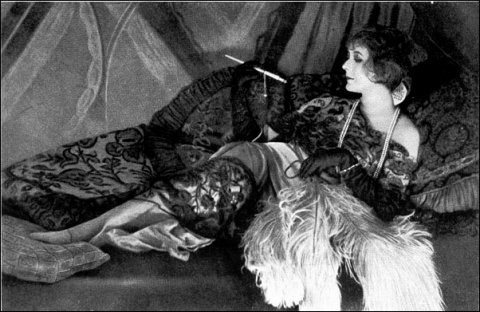
A n i t a B e r b e r
Gedicht für Sebastian Droste
I c h
Wachs schimmerndes Wachs
Ein Kopf – ein Brokatmantel
Wachs –
Rot – wie Kupfer so rot und lebende Haare
Funkelnde Haare wie heilige Schlangen und Flammen
Tot
Millionenmal tot
Verwest
Und schön – so schön
Blut wie fliessendes Blut
Ein Mund stumm
Nacht ohne Sterne und Mond
Die Lider – so schwer
Schnee wie kalter wärmende Schnee
Ein Hals – und fünf Finger wie Blut
Wachs wie Kerzen
Ein Opfer von ihm

S e b a s t i a n D r o s t e
Gedicht für Anita Berber
Tanz Anita zu eigen
Aufwirbelndes jauchzendes Begehren
Sprung – – –
Webenden Wellen
Weichwelle Wogen
Kreist kreist unendliche Kreise – – –
Verlangendes Weben schwebt wellwoges Wogen
Auf einsamen Thronen thront der Gott – –
Sturzwelles spitzes grelles Begehren
Kreisgelles gelbgrünes Belachen
Zerkreisen zerwellen zerwogen zerhauchen
Springpflanzartiges Zerblättern
Beschwingen
Besingen
Klang –
Aufjublendes Zerfliessen
Zergreifen
Zerweben – –
Tanz – – –
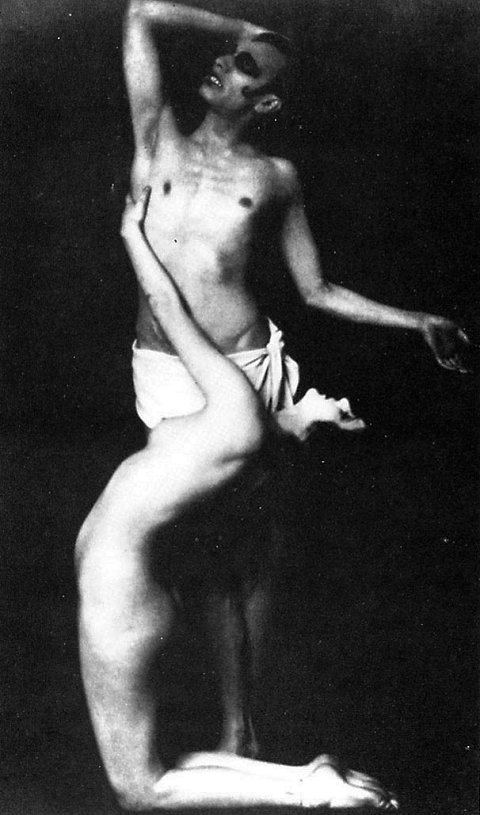
Anita Berber (1899-1928)
& Sebastian Droste (1892-1927):
2 Gedichte
fleursdumal.nl magazine
More in: Anita Berber, Anita Berber, Berber, Anita, DANCE & PERFORMANCE
Thank you for reading Fleurs du Mal - magazine for art & literature